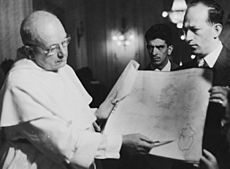Louis-Joseph Lebret facts for kids
Louis-Joseph Lebret (1897–1966) was a French Dominican priest, scientist, and thinker. He is known for his ideas on how to make the economy work better for people. He believed in a "human economy" that helps everyone. He was a pioneer in what is called "development ethics."
Contents
Early Life and Calling
Louis-Joseph Lebret was born on June 26, 1897, in Minihic, France. His family were sailors and farmers. His father built ships. Lebret joined the Brest Naval School. He became a marine officer. He fought in World War I with the Lebanese squadron. For a short time, he was in charge of the port of Beirut. In 1922, he became a teacher at the Naval Academy. After visiting a Jesuit convent, he felt a strong call to religious life. He left the marines in 1923. He became a Dominican priest and was ordained in 1928.
Helping Fishermen in St. Malo
After finishing his studies, Lebret was sent to Saint-Malo in 1929. There, he saw how poor the fishermen and their families were. He talked to many fishermen. He learned about their problems and what they needed. He wanted to find ways to help them.
For ten years, he studied why the fishing industry was struggling. He looked at unemployment and low wages. He also saw how big international companies tried to control the best fishing areas. Lebret realized that small local fishermen were struggling because of bigger problems in the market. He studied fishing conditions in many places. These included Britain, the Baltic Sea, and the Mediterranean Sea. He wrote over 400 reports on these conditions. At the same time, he helped set up trade unions and co-ops. These groups worked to change how business was done.
During World War II, he helped protect French fishing. He also oversaw rules for merchant ships. In 1941, he started a group called Économie et Humanisme (Economy and Humanism). He founded it in Marseille with others like François Perroux. Their goal was to study how economies work. They wanted to make sure the economy served people. In 1942, they started a magazine called Revue Economie et Humanisme.
Focus on Global Development
In 1947, Lebret traveled to Brazil to give lectures. This trip made him focus on helping countries that were still developing. He worked in many countries. These included Brazil (1947-1954), Colombia (1955), Senegal (1958-1959), and Lebanon (1960-1964).
Lebret believed that big, long-standing problems could not be fixed by just wishing them away. He thought these problems needed changes to the way things were set up. This meant truly understanding how these systems worked. He believed in combining careful research with real-world action. The United Nations recognized him as an expert. He knew a lot about why living standards were so different around the world.
In 1958, he started the International Institute for Research and Training, Education and Development (IRFED). This group later became the International Center Development and Civilizations - Lebret - IRFED.
Lebret strongly believed that the Catholic Church should care about global development. He saw the challenges that poverty in many countries brought to the Church. He pushed for more support and friendship with poorer nations. Pope Paul VI asked him to be an expert at the Vatican Council. He helped write an important document called Gaudium et spes. He also represented the Holy See at the first UNCTAD meeting. This was the United Nations Conference for Trade and Development in Geneva in 1965. Père Lebret was also one of the experts who helped write the 1967 encyclical Populorum progressio.
Lebret passed away in Paris on June 20, 1966.
His Important Ideas
Denis Goulet said that Lebret was one of the first to speak up for development based on good values. Lebret's main works include:
- The Mystique of a New World (1941) - later called The Discovery of the Common Good
- Action, Movement Toward God (1949)
- The Human Ascent (1951)
- Dimensions of Charity (1958)
- Concrete Dynamics of Development (1961)
Goulet says Lebret left five important lessons for our connected world:
- People making decisions about development must listen to what local people truly need.
- Small, local problems are often connected to bigger, worldwide issues.
- Real needs are more important than just what people want or can afford.
- Development is about many things. It includes economic, social, political, cultural, environmental, and spiritual well-being.
- We need to work together globally to help each other.
See also
 In Spanish: Louis-Joseph Lebret para niños
In Spanish: Louis-Joseph Lebret para niños


